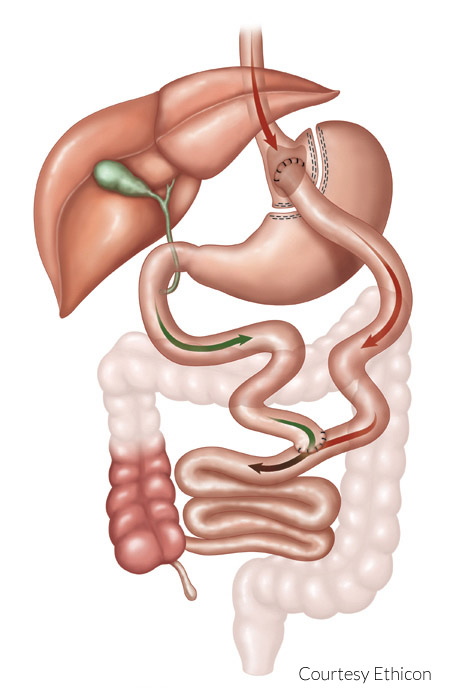Gastric Bypass (Roux-en-Y) Surgery
 Roux-en-Y gastric bypass surgery is the second most common bariatric surgery performed in the United States today. It is both a restrictive and a malabsorptive type of bariatric surgery, meaning that it restricts both the amount of food that can be eaten and the amount of calories that are absorbed by the small intestine. Because of the exceptional weight loss and disease improvement potential, the gastric bypass is widely considered to be the gold standard in bariatric surgery.
Roux-en-Y gastric bypass surgery is the second most common bariatric surgery performed in the United States today. It is both a restrictive and a malabsorptive type of bariatric surgery, meaning that it restricts both the amount of food that can be eaten and the amount of calories that are absorbed by the small intestine. Because of the exceptional weight loss and disease improvement potential, the gastric bypass is widely considered to be the gold standard in bariatric surgery.
The Gastric Bypass Procedure
During the Roux-en-Y gastric bypass surgery procedure, the top portion of the stomach is sectioned off using surgical staples to create a small pouch about the size of a golf ball. Because this small stomach pouch will only hold one to two ounces of food, the patient’s appetite will be more quickly satisfied. This is the restrictive portion of the procedure.
During the malabsorptive part of the procedure, the pouch is connected to the lower part of the small intestine, bypassing the upper portion where most of the calories from food are absorbed by the body.
The gastric bypass is most often performed in a minimally invasive manner. It can also be performed with the assistance of our da Vinci surgical robot. For patients that do not qualify for a minimally invasive surgical procedure, gastric bypasses can also be performed in the traditional open manner. Rarely, a minimally invasive gastric bypass will have to be converted to an open bypass during surgery. A minimally invasive approach had less pain and quicker healing post-op as opposed to an open surgery method.
Recovery After Gastric Bypass
Following Roux-en-Y gastric bypass surgery your hospital stay will last from two to four days. This time frame rests largely on how quickly the patient is able to recover as well as whether the procedure was performed in an open manner or laparoscopically. Most patients can return to their normal routines within six weeks. Patients should avoid strenuous activity until cleared by our office.
Benefits of Gastric Bypass Surgery
Gastric bypass surgery has many benefits that help patients improve their lives including
- Decreased Appetite: Following gastric bypass surgery, most patients report feeling less hungry and are less preoccupied with food, making weight loss much easier.
- Significant Weight Loss: Many gastric bypass surgery patients begin to lose weight immediately following surgery, and typically continue to lose weight for up to two years.
- Improved Health: One of the most important benefits of gastric bypass surgery, as with other types of weight loss surgery, is a decrease in the health risks associated with morbid obesity, as well as improved emotional health.
Risks and Complications of Gastric Bypass Surgery
Many complications associated with gastric bypass surgery can be avoided by following the post-operative diet plan and by taking proper vitamin and mineral supplements. The following complications are some of the most common.
- Dumping Syndrome: Nausea, weakness, dizziness and other adverse symptoms may occur when food is released from the stomach too quickly into the small intestine, an event that is often caused by eating too much at one time or ingesting foods high in sugar or fat. Although dumping syndrome is not life threatening, it can be an uncomfortable complication of gastric bypass surgery.
- Weight Regain: The stomach pouch may stretch over time, potentially leading to overeating and weight regain.
- Diet Deficiencies: Along with calories, gastric bypass surgery also limits the amount of vitamins and minerals that the body can absorb from food. Chronic anemia, osteoporosis, and metabolic bone disease may be caused by certain vitamin and mineral deficiencies. These deficiencies can be managed through vitamin and mineral supplementation.
Other Post-operative Complications
Some complications can cause serious and even life-threatening problems that may require revisional surgery. Following gastric bypass surgery, our patients are closely monitored by our surgeons, bariatric surgery coordinator, and nutritionist to make sure that the risk of complications is reduced or, if they arise, that they are treated promptly.
- Staple line problems
- Stomach acid leakage
- Ulcers
- Blood clots
- Infection
- Chronic vomiting
- Gallstones
- Hernias
- Bowel obstruction
- Diarrhea
Laparoscopic vs Open Gastric Bypass Surgery
Open gastric bypass surgery involves the use of traditional surgical methods, often requiring abdominal incisions of up to ten inches, while laparoscopic surgery is minimally invasive. During laparoscopic obesity surgery, a laparoscope with a tiny camera is inserted into the body through a small incision. We use a computer monitor to view the inside of the body while performing the surgery remotely.
Benefits of Laparoscopic Gastric Bypass Surgery
In addition to reduced scarring, laparoscopic procedures also have the following benefits:
- Reduced hospital stay following surgery
- Quicker recovery time
- Less post-operative pain
- Reduced risk of hernias and infections
Candidates for Laparoscopic Gastric Bypass
At our Long Island-area practice, gastric bypass surgery is typically performed as a laparoscopic procedure. However, your safety is our primary concern, and open surgery may be better for some patients, including those with extremely high BMIs or certain health conditions that make laparoscopic obesity surgery risky.
